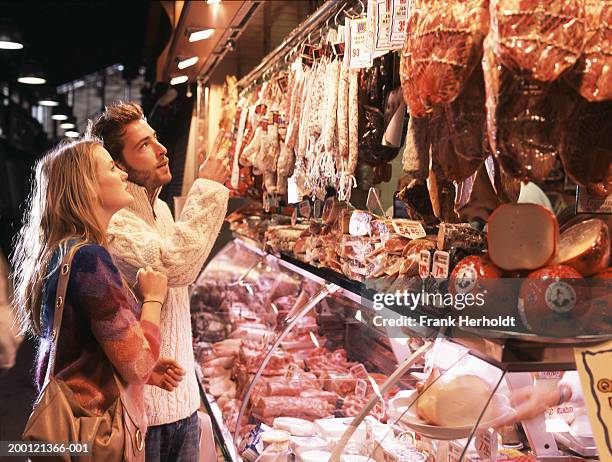Explore the Variety of Fresh Meats at Bagley Meat Market Edwardsville IL Today
Explore the Variety of Fresh Meats at Bagley Meat Market Edwardsville IL Today
Blog Article
Why Shopping at a Neighborhood Meat Market Guarantees Fresh, High-Quality Cuts
Shopping at a neighborhood meat market provides distinctive advantages that commonly go unnoticed by consumers accustomed to bigger retail chains. These markets offer straight access to fresh, top notch cuts, a result of reduced transport time from farm to counter. This not just enhances taste but likewise sustains neighborhood farmers, promoting neighborhood partnerships and sustainable methods. Rigorous high quality control determines make certain that each purchase meets high requirements of safety and security and quality. The implications of choosing regional prolong beyond instant benefits, triggering a better assessment of what this option genuinely indicates for both customers and the neighborhood economic situation.
Advantages of Neighborhood Sourcing
In the world of food procurement, the benefits of neighborhood sourcing attract attention prominently. By purchasing meat from local markets, customers get direct access to items that are commonly fresher and a lot more tasty than those found in bigger, industrial supermarkets. Neighborhood sourcing minimizes the time and range food takes a trip from farm to table, which not just improves taste yet likewise preserves dietary value.

Additionally, neighborhood sourcing frequently supplies openness pertaining to the origins of the meat. Consumers can inquire regarding the farming methods made use of, pet well-being standards, and whether the meat is organic or grass-fed. This info equips buyers to make enlightened decisions aligned with their values.
Quality Assurance Requirements
Neighborhood meat markets frequently follow rigorous quality assurance criteria that make certain the items used satisfy high security and freshness standards. These requirements commonly include different stages of the meat manufacturing process, from sourcing to dealing with and storage.
First, neighborhood markets commonly establish stringent distributor requirements, ensuring that just trustworthy ranches and producers are made use of - bagley meat market edwardsville il. This decreases the likelihood of contamination and advertises higher pet welfare criteria. Furthermore, many neighborhood meat markets execute normal evaluations to verify that the meat is refined under sanitary problems, further decreasing health and wellness threats
Temperature control is an additional important aspect of quality control. Regional meat markets regularly keep track of refrigeration systems to keep optimal storage space temperatures, guaranteeing that meat remains secure and fresh for intake. Furthermore, the implementation of traceability systems permits markets to track the origin of their products, providing transparency and liability.
Finally, team at local meat markets are frequently educated to identify indicators of wasting and recognize appropriate handling strategies. This dedication to quality assurance not only raises the overall criterion of the meat yet also cultivates consumer trust, making regional meat markets a reputable source for high-quality cuts.
Supporting Regional Farmers
Sustaining regional farmers is crucial for cultivating a sustainable food system and enhancing community resilience. When consumers choose to shop at regional meat markets, they directly contribute to the incomes of farmers in their region. This not only supports the local economy but also strengthens the farming field, making certain that it continues to be feasible and lively.


Additionally, sustaining neighborhood farmers cultivates a sense of community and connection in between manufacturers and consumers. It encourages transparency in food sourcing and imparts depend on, as consumers can create relationships with the individuals who raise their food. This direct link eventually brings about an extra involved and educated public, which is essential for promoting for description sustainable agricultural practices in the future.
Sustainable Practices
Sustainable practices in meat markets play an important function in advertising environmental stewardship and making sure pet welfare. Regional meat markets typically prioritize sourcing their products from farms that implement ethical and sustainable farming approaches. These techniques consist of rotational grazing, which assists maintain soil health and lowers carbon exhausts, along with decreasing using prescription antibiotics and hormones in livestock.
Moreover, neighborhood meat markets commonly highlight transparency in their supply chains. Customers are given with info concerning the origin of their meat, permitting them to make educated choices that straighten with their worths. By supporting neighborhood farmers that practice sustainable techniques, consumers add to the conservation of biodiversity and the decrease of transport discharges related to long-distance meat circulation.
Additionally, numerous neighborhood meat markets engage in waste reduction techniques, such as using every component of the animal and advertising off-cuts that could or else go unsold. By fostering an extra sustainable strategy to meat usage, these markets not only supply top quality items however additionally contribute favorably to the environment and pet welfare. Essentially, shopping at a neighborhood meat market aligns customers with a broader motion in the direction of accountable and moral food sourcing.
Personalized Customer Care
Shopping at a meat market commonly encompasses greater than simply the products provided; it is additionally about the experience and the connections constructed in between customers and personnel. Individualized client service is a characteristic of local meat markets, setting them besides bigger grocery chains. Well-informed personnel link put in the time to understand private client choices, making certain that each go to is tailored to certain demands.
Customers benefit from professional recommendations on cuts, food preparation approaches, and prep work tips, fostering a sense of count on and loyalty. This individualized communication enables consumers to ask inquiries and look for referrals, bring about educated purchasing decisions. Staff members frequently remember regular customers and their preferences, creating an inviting ambience that grows area connections.
Additionally, individualized service encompasses special requests, such as custom cuts or specific prep work approaches, which bigger sellers may not accommodate. This degree of focus strengthens the commitment of local meat markets to quality and consumer contentment.
Essentially, customized customer support not just improves the shopping experience yet additionally makes sure that clients leave important site with the very best items fit to their cooking demands, making every check out a gratifying one.
Conclusion
Supporting regional farmers cultivates community connections and reinforces the local economic climate, while lasting techniques contribute to environmental stewardship. In addition, personalized client solution boosts the shopping experience, making regional meat markets a favored selection for customers seeking both high quality and honest factors to consider in their food sourcing.
The effects of choosing local prolong past prompt advantages, prompting a closer evaluation of what this option genuinely suggests for both customers and the local economy.
Supporting local meat markets likewise contributes to the regional economic climate. Local meat markets often check refrigeration systems to preserve optimal storage space temperatures, making certain that meat continues to be fresh and risk-free for consumption.Regional farmers are frequently extra attuned to the particular demands of their areas, expanding plants and increasing animals that straighten with neighborhood preferences and preferences. Supporting local farmers cultivates area partnerships and reinforces the regional economic climate, while sustainable practices add to ecological stewardship.
Report this page